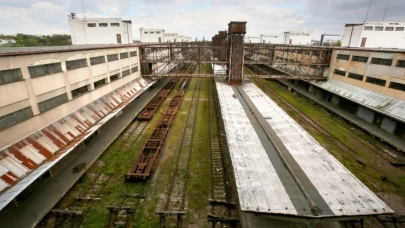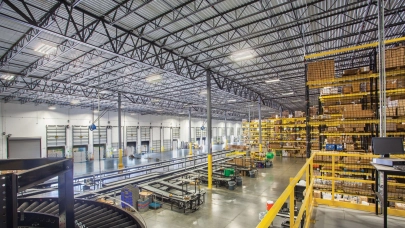
The Managing Director of JLL Czech Republic expects a fairly quiet year in 2023 in the investment market. But in the industrial market, next year should be a strong one due to continued steady demand, says Andrew Peirson in an interview with Property Forum.
You became Managing Director of JLL in Prague almost two years ago, in January 2021. The market has faced several large external shocks since then. Which business lines have you managed to grow despite all the challenges? Which ones struggled more than others?
Our ESG team has grown beyond the expectations we had at the start. We now have seven in the team in Prague and during 2023 this will grow to over twenty, as a centralised part of our EMEA Sustainability practice from the Prague office. The investment market is obviously going through a testing time, as increased finance costs forced the abandonment of a number of deals during 2022. I felt that the market shifted quickly during the late summer and we expect a fairly quiet year in 2023 for the investment market as the market slowly re-prices.

Andrew Peirson
Managing Director
JLL Czech Republic
What are your business expectations for 2023? Which market segments and business lines do you expect to be recession-proof?
The industrial market appears to be holding up well, and whilst we can’t describe the sector as recession-proof, we do expect a strong year in 2023. We are still seeing large logistic requirements in western Czechia coming from Germany, whilst in the east of Prague we will soon announce an extremely large manufacturing deal as companies still look to benefit from a more favourable labour market. Our professional services sector is more of what could be described as recession precession-proof market-leading valuation team growing well year on year. It’s a business that will face pressures over the next 12 months as we deal with the re-pricing, and it’s a time when real estate owners will also need to show patience to all valuers in the market.
Before returning to Prague, you spent over 10 years working in the Balkans region. What are the differences between doing (real estate) business in Prague and Belgrade?
I loved my time in the Balkans and always felt that Belgrade was, and still is, a misunderstood city. It’s a city with a larger population than Prague and it has huge potential, but does suffer from transparency issues and also historic views from the west that are difficult to shake off. However, the main difference is the sheer level of competition in Prague, compared to the Balkans. For a relatively small market, Prague is somewhat over-subscribed by large real estate agencies, whereas in Prague we were always the only major real estate firm that had invested in the market with an owned business.
The long-term impact of the Covid pandemic on the office market is still unclear. New office supply in Prague is low as developers are taking a wait-and-see approach. How do you expect demand and rents to change in the next 12 months?
Covid had an obvious effect on the market, and it is naïve to suggest demand did not decrease, with the majority of large global corporates reducing their footprints over the past two years. As a result, you would expect rents to fall but we are witnessing the opposite. Increases in construction and finance costs mean that development is simply not viable at pre-2020 rates and this is pushing up asking rents on new developments which is having a positive impact on existing stock. So, in general demand from new market entries and expansions is down but we expect to see further rent increases, particularly for offices in central areas of Prague.
How are you seeing tenants and landlords handling the ongoing energy crisis?
From the office tenant perspective in the short term, there isn’t a great deal they can be doing, other than be vigilant with their use of energy. Longer term, if energy costs remain high, there will be an increased focus from office tenants to locate in energy-efficient buildings, and we would therefore expect to start seeing increasing pricing variances between new sustainable buildings and those developed when sustainability and energy costs weren’t at the forefront of the market. The bigger impact is on manufacturing companies which often have huge energy needs and constant pressure on margins. From an industrial perspective, the cost of goods will increase as the cost to manufacture, store and deliver the goods increases and, from the evidence of current and predicted inflation rates this looks to be unavoidable. Landlords will of course need to ensure the basic changes are made, a few examples being lighting, smart meters, water retention and usage, and to then look at investing for the long term with the use of things like solar/PV and below ground heating. With a lack of investment activity expected during the next 12 months, we do expect landlords to use the year to improve the efficiency of buildings throughout the year to ensure their assets remain liquid for future potential sales activity.
Data plays a crucial role in real estate transactions although market players often still don’t have the right tools to make the most out of it. What’s your company’s approach to data? Are you investing in technology that can help understand and use data better?
From a local level, in Prague, we have created a Client Portal, which is an interactive data tool in Power BI that brings up-to-date information from office, flex, industrial and residential markets, and is currently being utilised by a number of our key clients. It can be accessed via a link in a computer or mobile phone so the client has all the key data at hand at any time. On top of this, we work heavily with ArcGis which is a tool based on GPS coordinates. It is used a lot for mapping the location, calculating time commuting, and catchment analysis and can be a great support in pointing out the right location for supply chain operators. Generally, in Prague, we are lucky that we are working in a fully transparent marketplace, with agents and landlords sharing info that we utilise to create our data-based tools. This creates trust in the markets and ensures both existing and potential investors can more easily predict future trends in terms of supply and demand.
What’s next for JLL in the Czech Republic? What are your current plans for further developing the business?
The past two years have been hectic in terms of restructuring a number of areas within our business. This is why I was asked to return to Prague and has been a real learning experience for me personally, especially in dealing with the high level of competitiveness in the market. I’m now extremely confident that we are going into 2023 with a fantastic team and an incredibly large pipeline of work. We have a great mix of experience, with several people at JLL being with us in Prague for over 20 years, and we have combined this with some really bright young additions. The future looks very bright for JLL in the Czech Republic.



